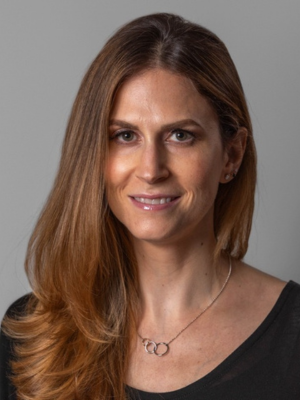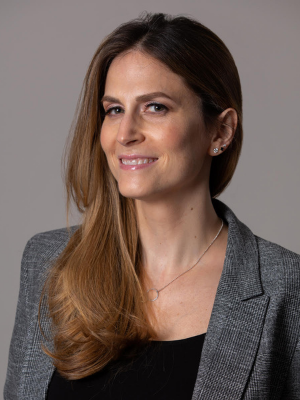 “I thrive on change as opposed to shying away from it,” says Erica Klinkowize. “By honing the skill over the years of accepting that nothing will stay the same, I have been able to weather storms and adapt.”
“I thrive on change as opposed to shying away from it,” says Erica Klinkowize. “By honing the skill over the years of accepting that nothing will stay the same, I have been able to weather storms and adapt.”
Previously profiled in 2022 as the CBNA Treasurer for Citi, Klinkowize has since continued her transformative journey in the financial industry, bringing her passion for complex challenges and people-focused leadership to her current role as EVP and U.S. Treasurer at TD Bank. She speaks to how she views resilience, adaptability, and intentional leadership as foundational to her career evolution.
Thriving in Transformation
Energized by opportunities to make an impact, Klinkowize is as much a leader who embraces challenge as she does change. Consistently choosing to push her boundaries throughout her career, Klinkowize acknowledges, “I’m not drawn to easy paths.” This penchant for challenge has defined her career and leadership, from her years at Goldman Sachs and Bank of America to her current role as EVP and U.S. Treasurer at TD Bank.
“I gravitate towards these challenges. Whether it’s transitioning to Citi when they are in transformation, or specifically taking this position at TD to help enhance and build out the US Treasury organization, I strive to make a visible positive change.”
Klinkowize’s passion for transformation is matched by her deep interest in the complexities of the financial industry and the dedication of those who thrive within it.
“Treasury is an unbelievably exciting space. There are an incredible number of topics, a multitude of risks you’re managing,” she explains. “I’m constantly learning and leading.”
Beyond the intellectual demands, Klinkowize is inspired by the people she gets to work with, “they are very passionate, and it resonates with me. I want to support them and help them as they navigate a very complex environment…there is so much to accomplish, and there are so many people to help.”
A Change Agent with a Vision for Leadership
As a leader, Klinkowize embraces the role of a change agent, acknowledging, “I can’t accept the status quo. I can’t let myself not ask a question.” It’s that continual strive for improvement that motivates her, “it’s less about innovation and more about what else is out there, how can you be better at what you do.”
In driving transformation, Klinkowize underscores the ability to navigate and support multiple levels of change, from the individual to the team to the organization.
“It’s about guiding a large group emotionally and intellectually through change while recognizing you are part of a larger whole. You can’t make a change and think it won’t have downstream impacts—you have to stay mindful of upstream dynamics within the company.”
She continues, “Being a change agent is causing the change, but then also managing the emotional, intellectual, and organizational side. The internal and external clarity on what you’re doing, and how you’re doing it.”
Klinkowize emphasizes that effective change also requires being skilled at collaboration and leading with influence.
“I’m a big connector of people. If there’s a problem at hand, it doesn’t matter if you work for me or not, let’s come together to solve the issue.” She continues, “it’s important to be able to inspire people who don’t work for you, lead without directly managing them.”
Building Resilience
Even as Klinkowize embraces change and the transformation that can come from it, she recognizes that there were times in her career where she felt more like she was weathering the storm than riding on a wave of opportunity.
“I want to be honest and open about my experiences, so that women don’t feel that it was all straight shot up, because it certainly was not.”
She recounts moments in her career that might have deterred others—embarrassing missteps in meetings, even an instance of demotion. But rather than dwell on these experiences, Klinkowize speaks to the importance of navigating those difficult moments and emerging stronger on the other side as key to developing resilience and adaptability.
“It comes from learning and paying attention to how you act in those situations. How you act under stress, under duress, in moments where you’re embarrassed—you keep building up that stamina.”
Klinkowize also points to the power of mentorship and empathetic support in weathering challenging periods. “It’s important to have mentors you trust, both inside and outside of work because you need a voice of reason,” she advises. She maintains that the support of others is critical no matter how high one climbs up the ladder of leadership.
“The more senior you become, the greater the risks in your career. Not everyone will be nice, and not everything will be fair. That’s why resilience and stamina are essential—and why surrounding yourself with the right people matters.”
Intentional Leadership
With her breadth of leadership experience, Klinkowize is thoughtful in her approach to building a team culture, seeing it as a deliberate, ongoing process. When she steps into a new role, she takes time to think about what she wants to bring to the position and how she can improve from her previous experiences.
“As I’m gearing up to start, I’m very intentional about the person that I want to be and the environment I want to create around me. I prepare…I don’t wing it.” This intentionality is evident in the steps she took to establish her team’s culture at TD Bank.
“I made it clear that integrity was my number one standard, setting the tone for everything. I approached it very deliberately—I changed the team name, created a distribution list. Also, I helped craft a story, like an elevator pitch, to clearly describe what my organization does. Everything was very purposeful.”
She notes that her goal is to create an environment where everyone understands their role and feels connected to the larger mission. “I want the rest of the firm to understand what we are becoming,” she explains. By fostering a sense of clarity and collaboration, Klinkowize ensures that her team is aligned and motivated. Her approach underscores her belief that effective leadership is about more than strategy; it’s about creating a shared vision that everyone can rally behind.
A Legacy of Positive Impact
Beyond building the culture, Klinkowize is intentional in striking a balance between driving excellence without compromising the well-being of her team.
“We have to balance how hard we make people work,” she states, acknowledging that while finance is a high-pressure field, it’s essential to create a sustainable work environment.
Klinkowize also recognizes that not everyone will embrace change in the same way, and as a leader of transformation she wants to “help people understand that we will come out the other side.”
Looking ahead, Klinkowize hopes to leave a legacy of positive impact, both in her organization and in the people she leads.
“I want to contribute to the financial safety and soundness of the company, innovate, and bring excellence. I want to continue to be a role model as an empathetic and accountable leader.”
Outside of work, Klinkowize immerses herself in science fiction and fantasy books, cherishes moments with her family and dogs, but admits with a laugh, “I still struggle to find enough time to exercise.”
By Jessica Robaire


